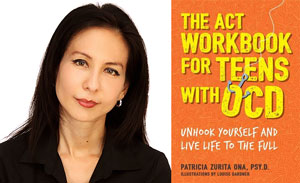
The ACT Workbook for Teens with OCD: Unhook Yourself and Live Life to the Full
 Wright Institute Clinical Psychology Adjunct Faculty member Patricia Zurita Ona, PsyD, is releasing a new workbook based on Acceptance and Commitment Therapy (ACT) and Exposure Response Prevention (ERP). The ACT Workbook, to be released in December, teaches teens with Obsessive-Compulsive Disorder (OCD) "new skills to handle the stream of pesky obsessions" that show up in their mind.
Wright Institute Clinical Psychology Adjunct Faculty member Patricia Zurita Ona, PsyD, is releasing a new workbook based on Acceptance and Commitment Therapy (ACT) and Exposure Response Prevention (ERP). The ACT Workbook, to be released in December, teaches teens with Obsessive-Compulsive Disorder (OCD) "new skills to handle the stream of pesky obsessions" that show up in their mind.
Zurita Ona dedicates this workbook to all the teens she's worked with. They are "the best consultants I have ever had," says Zurita Ona. "With this workbook, I hope to make ACT and ERP less mysterious and more accessible."
Zurita Ona continues:
There are countless teens that wake up every day struggling with disturbing thoughts. Despite all the research we have on ERP, many teens still end up not receiving proper care.
When working with teens, something becomes very clear: they don't like to be told what to do, what to think, or what to say. However, that conversation shifts when they can make their own choices.
This workbook makes ACT accessible to teens and brings to the forefront the Choice Point, a tool that helps teens to exercise their natural capacity to choose. It teaches teens ACT and ERP skills to handle the stream of pesky obsessions that show up in their mind.
Lastly, I really want to highlight that this workbook is written from a therapists' room, and can be used as a roadmap for clinical work. It's full of practical exercises, activities, and teen-friendly illustrations by Louise Gardner. I use the choice point to conceptualize OCD, map every single exposure session, build teens' capacities to choose their responses when dealing with obsessions, and support them to make a shift from compulsions and avoidant behaviors to values-guided exposures and behaviors.
The book will be released on December 19, and is available for pre-order on Amazon and Barnes & Noble.
Learn more about the Wright Institute's Master of Counseling Psychology program.
Learn more about the Wright Institute's Doctor of Clinical Psychology (Psy.D.) program.
